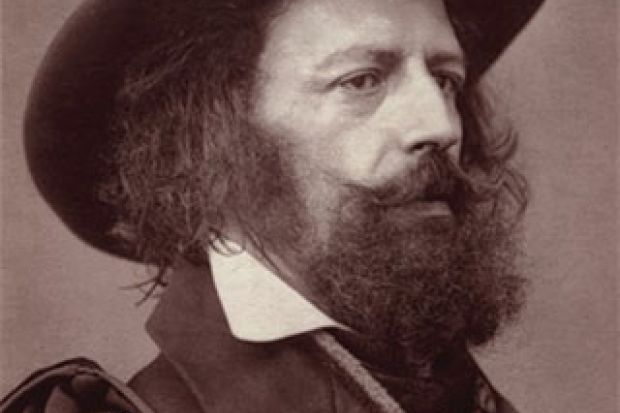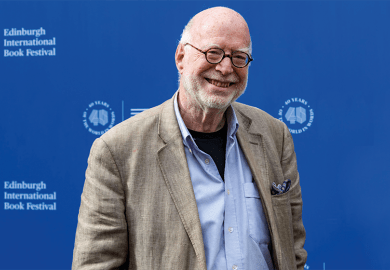The picture of Tennyson on the front cover of John Batchelor’s brimful biography is striking to say the least: he looks like a pistol-whirling Wild Bill Hickok. He was, of course, nothing of the sort. He can hardly be said to have been involved in any serious literary spats, let alone shoot- outs - although there was that business in which he and his close friend Arthur Henry Hallam went to Spain to deliver letters and money to rebels fighting to depose the Spanish monarchy. Well, he was young - poets in their youth and all that. Tennyson’s journey from radical to pillar of the Establishment followed that of Wordsworth, whom he succeeded as poet laureate in 1850.
William Gladstone famously went in the other direction. The man who would (repeatedly) become prime minister was at one time a rival of Tennyson for Hallam’s affection. He would later criticise the poem Locksley Hall Sixty Years After (1886) because he felt Tennyson had not acknowledged the progress Great Britain had made since the publication of its precursor, Locksley Hall, in 1835. This is just one of the many links Batchelor highlights between Tennyson and some of the principal players on the Victorian stage. There is even a walk-on part for Edward Lear, who “came to think of the Tennysons, Alfred and his wife Emily, as a possible refuge from his emotional storms”. Lear was homosexual and in love with Franklin Lushington, whose family were close friends with Tennyson. George Eliot’s view that society is a web of connections is as evident in this book as it is in Middlemarch.
Contemporaries were fascinated by Tennyson’s appearance (one even hid behind a wall to observe him more closely). Well over 6ft tall, he had a chest that would make a bodybuilder weep and more hair at 40 than most men have at 20. The fact that he dressed like a Spaniard, with a wide-brimmed floppy hat and long black cloak, only added to his allure. Queen Victoria was as captivated with him as she was by the stylish Benjamin Disraeli. But both men were out-peacocked by Robert Hawker, a clergyman no less, with whom Tennyson made friends when he went to Cornwall to research Arthurian legends for what would become Idylls of the King. Hawker was “a flamboyant dandy” who also liked to dress as a mermaid. Batchelor’s biography is full of such vignettes, which cumulatively reveal a 19th- century Britain that was probably closer in spirit to Alice in Wonderland than to Samuel Smiles’ Self-Help.
Tennyson was the most popular and famous poet of the 19th century. With his theatrical appearance and his superb command of dramatic monologue evident in poems such as Ulysses, it is no surprise that he eventually turned to playwriting, although it is for poetry that he will be remembered. No one could write verse as musical or as mellifluous. Many of the lines from In Memoriam, the great poem of the Victorian age, have become part of everyday speech: “Tis better to have loved and lost/Than never to have loved at all.” My own favourite from the poem, which is part elegy for Hallam and part exploration of the clash between science and religion, is this: “And Time a maniac scattering dust.” Tennyson may have been no marksman with a pistol, but some of his lines really hit home.
The danger of biography is that it can be just one damned fact after another. But that’s not the case here, with Batchelor drawing on research from the past 30 years to construct a lively portrait. “No luxury like scratching,” said Tennyson of his eczema to a neighbour, James Mangles, whose surname sounds as if it was invented by Dickens; “beats fornication all to pieces.” He was not usually one to make light of his troubles, though, and there are telling insights into his depression, hypochondria and restlessness.
One of the many strengths of this biography is the detailed discussion of Tennyson’s poetry. Another is the ability to conjure the Victorian sensibility, whether it is to do with male friendship, the expression of grief or the desire for respectability. Tennyson wanted something more, to understand the nature of the Universe in which he lived, but he could only do that by writing poems about the past.
In the end he became a victim of his own myth. Perhaps that’s why he hated biographies: they might reveal the truth. If he could read this one, he might change his mind. And understand himself better.
Tennyson: To Strive, To Seek, To Find
By John Batchelor
Chatto and Windus, 448pp, £25.00
ISBN 9780701180584
Published 1 November 2012
Register to continue
Why register?
- Registration is free and only takes a moment
- Once registered, you can read 3 articles a month
- Sign up for our newsletter
Subscribe
Or subscribe for unlimited access to:
- Unlimited access to news, views, insights & reviews
- Digital editions
- Digital access to THE’s university and college rankings analysis
Already registered or a current subscriber? Login




